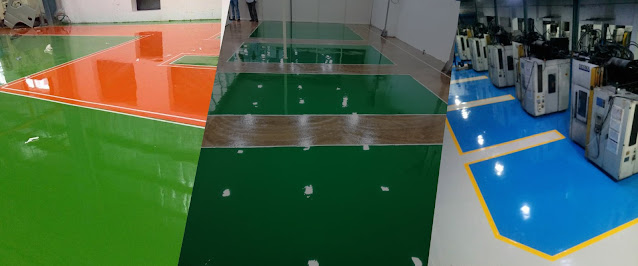Industrial Epoxy Flooring: The Ultimate Solution for High-Performance Flooring
Industrial epoxy flooring is a high-performance flooring solution that is designed to withstand the toughest conditions found in industrial and commercial environments. Industrial epoxy flooring offers a range of benefits, including durability, chemical resistance, and ease of maintenance. In this article, we will explore what industrial epoxy flooring is, its benefits, and some of the key considerations to keep in mind when choosing this flooring solution.
What is Industrial Epoxy Flooring?
Industrial epoxy flooring is a flooring system that is made by combining epoxy resin and hardener. The mixture is poured onto the surface and spread out using a trowel, roller, or squeegee. As the epoxy resin and hardener combine, a chemical reaction takes place that creates a solid, durable surface. The result is a hard, smooth, and glossy surface that is resistant to abrasions, chemicals, and stains.
What are the Benefits of Industrial Epoxy Flooring?
Durability: Industrial epoxy flooring is one of the most durable flooring solutions available. It can withstand heavy foot and vehicle traffic, making it an excellent choice for high-traffic areas like warehouses, factories, and industrial plants.
Chemical Resistance: Industrial epoxy flooring is highly resistant to chemicals, making it ideal for use in environments where chemicals are used or spilled. It is also resistant to oil, grease, and other substances that can cause damage to other types of flooring.
Easy to Clean and Maintain: Industrial epoxy flooring is easy to clean and maintain, making it an ideal choice for busy industrial and commercial settings. It is resistant to stains and spills, and can be easily cleaned with a mop or broom.
Aesthetics: Industrial epoxy flooring is available in a wide range of colors, textures, and finishes, making it easy to customize the look of your floors to suit your specific needs and preferences.
Safety: Industrial epoxy flooring can be made with additives to create a slip-resistant surface, making it a safer choice for areas like loading docks, walkways, and manufacturing areas.
What Should You Consider When Choosing Industrial Epoxy Flooring?
Surface Preparation: The success of an industrial epoxy flooring installation depends on proper surface preparation. The surface must be clean, smooth, and free of debris before the epoxy is applied. This can involve grinding, shot-blasting, or other methods of surface preparation.
Type of Epoxy: There are many different types of epoxy flooring systems available, each with its own unique properties and characteristics. It is important to choose the type of epoxy that is best suited to your specific needs and environment.
Application: Industrial epoxy flooring requires specialized tools and techniques to apply. It is important to choose a professional installer with experience in applying industrial epoxy flooring to ensure that the application is done correctly.
Environment: Industrial epoxy flooring is not recommended for outdoor use, as it is not UV-resistant and can be damaged by direct sunlight. It is important to consider the environment in which the industrial epoxy flooring will be installed and choose a solution that is appropriate for that environment.
In conclusion, industrial epoxy flooring is a high-performance flooring solution that offers a range of benefits, including durability, chemical resistance, and ease of maintenance. However, it is important to carefully consider factors like surface preparation, the type of epoxy, and the environment in which the flooring will be installed. With proper installation and maintenance, industrial epoxy flooring can provide a durable and attractive flooring solution for many years to come. If you are looking for a flooring solution that can withstand the toughest industrial and commercial conditions, industrial epoxy flooring may be the perfect choice for you.



Comments
Post a Comment